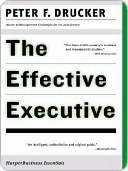More on this book
Community
Kindle Notes & Highlights
Intelligence, imagination, and knowledge are essential resources, but only effectiveness converts them into results. By themselves, they only set limits to what can be attained.
There are few things less pleasing to the Lord, and less productive, than an engineering department that rapidly turns out beautiful blueprints for the wrong product. Working on the right things is what makes knowledge work effective. This is not capable of being measured by any of the yardsticks for manual work.
The knowledge worker cannot be supervised closely or in detail. He can only be helped. But he must direct himself, and he must direct himself toward performance and contribution, that is, toward effectiveness.
The only resource in respect to which America can possibly have a competitive advantage is education. American education may leave a good deal to be desired, but it is massive beyond anything poorer societies can afford.
The responsibility is always mine, but the decision lies with whoever is on the spot.”
Knowledge work is not defined by quantity. Neither is knowledge work defined by its costs. Knowledge work is defined by its results. And for these, the size of the group and the magnitude of the managerial job are not even symptoms.
Similarly, every decision-maker does the same kind of work as the company president or the administrator. His scope may be quite limited. But he is an executive even if his function or his name appears neither on the organization chart nor in the internal telephone directory.
The executive’s time tends to belong to everybody else.
Executives are forced to keep on “operating” unless they take positive action to change the reality in which they live and work.
If the executive lets the flow of events determine what he does, what he works on, and what he takes seriously, he will fritter himself away “operating.” He may be an excellent man. But he is certain to waste his knowledge and ability and to throw away what little effectiveness he might have achieved. What the executive needs are criteria which enable him to work on the truly important, that is, on contributions and results, even though the criteria are not found in the flow of events.
The third reality pushing the executive toward ineffectiveness is that he is within an organization. This means that he is effective only if and when other people make use of what he contributes.


